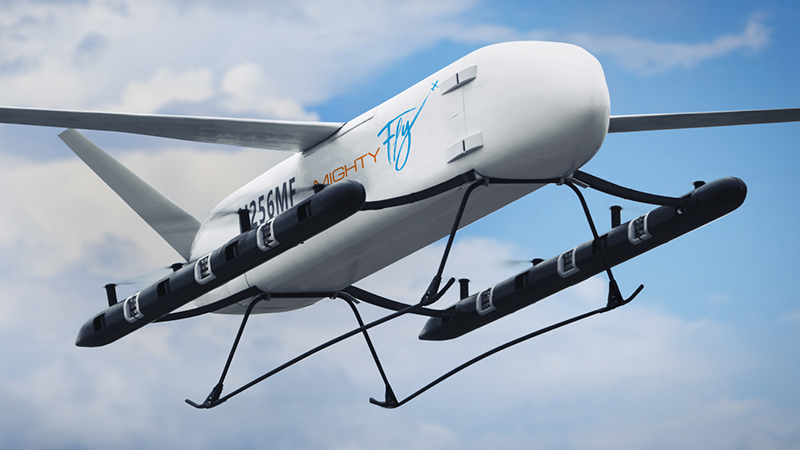

Image Courtesy: MightyFly
MightyFly, an autonomous logistic start-up based in San Francisco Bay Area, announced successful tests of its MF-100 automated Cargo eVTOL.
The tests will showcase the aircraft's vertical take-off and landing potential.
The MF-100 has a cargo capacity of 45 kilograms, and MightyFly estimates it will reach a speed of 241 kilometres and a range of 966 kilometres.
The aircraft has a hybrid-electric propulsion system that allows it to recharge its batteries mid-flight.
While many traditional eVTOLs carriers are working to become carbon-neutral and autonomous, MightyFly is ready for take-off.
The currently existing eVTOLs transport much lighter payloads and cover shorter distances.
However, MightyFly's range and payload are expected to expedite today's delivery space by combining the economy of scale with autonomy.
This will completely disrupt logistics by giving all businesses and other sectors access to quick and cost-efficient cargo delivery.
These and other factors give MightyFly the power to alter how businesses operate.
Compared to existing alternatives like Bell's APT, which can transport a payload 0f 45 kilograms for a distance of 56 kilometres, MightyFly MF-100 can cruise at a much faster speed covering a range of 966 kilometres.
It takes advantage of existing airport infrastructure, making it faster and more cost-effective.
Due to the faster and more cost-effective delivery, MF-100 is ideal for remote locations that would otherwise be inaccessible to normal eVTOLs.
Furthermore, MF-100 recharges its batteries in flight, making many deliveries to many hubs on a single flight route.
Loading and unloading cargo is always considered an intensive labour process.
MightyFly's autonomous loading and unloading system will transport and track cargo with less human interaction.
This will simplify the process, cut costs and delays, and reduce inefficiencies within the logistic sector.
Multi-leg cargo transfers increase costs further by multiplying both cost and time in each leg.
In addition to developing automated loading and unloading capabilities, MF-100 will reduce the number of necessary legs in a package's journey, which will significantly reduce cost and save on time.
Through patent-pending autonomous technology, MightyFly is remodelling the future of logistics.
The company is working on an autonomous aircraft that can carry a payload of 227 kg.
With other eVTOL companies not that far behind, the competition is only expected to stiffen.
As technology improves, the future of eVTOLs will continue to grow.